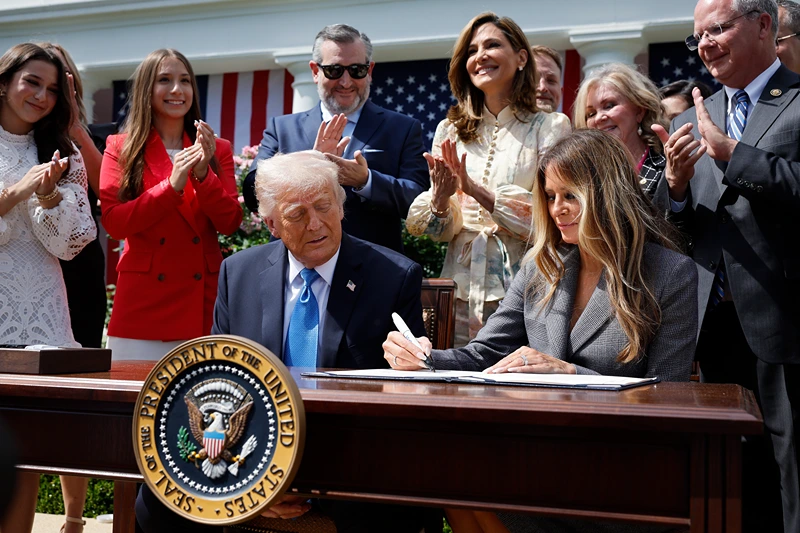
OAN Staff Abril Elfi
4:29 PM – Monday, May 19, 2025
President Donald Trump has signed the Take It Down Act into law, making “revenge porn” and explicit deepfake content illegal.
On Monday, Trump signed the bill, which aims to protect Americans from deep fake and revenge pornography. He was joined by First Lady Melania Trump, who has been championing this issue since her husband’s second inauguration.
“This legislation is a powerful step forward in our efforts to ensure that every American, especially young people, can feel better protected from their image or identity being abused through non-consensual, or intimate imagery of NCII,” the first lady said from the rose garden Monday afternoon. “Artificial intelligence and social media at a digital candy for the next generation,” she added. “Sweet, addictive and engineered to have an impact on the cognitive development of our children. But unlike sugar, these new technologies can be weaponized to shape beliefs, and sadly affect emotions and even be deadly.”
Trump continued to underscore the significance of the new legislation, highlighting what he described as an unprecedented level of bipartisanship that helped secure its passage. He credited, in part, the efforts of the First Lady for helping to bring the initiative to fruition.
“We’ve shown that bipartisanship is possible,” Trump said shortly before he signed the new act. “I mean, it’s the first time I’ve seen such a level of bipartisanship, but it’s a beautiful thing to do. I’m not even sure you realize, honey, you know, a lot of the Democrats and Republicans don’t get along so well. You’ve made them get along, and she didn’t even know about that. She didn’t know we had a problem. She didn’t know we had a problem. She got it.
The prevalence of so-called “deep fake porn” is rising, as deepfake video and photo creators typically accept paid requests for pornography with a buyer’s preferred person and a slew of content that circulate on deepfake websites.
Additionally, the term “revenge porn” refers to the act of targeting an individual—often a former romantic partner or someone perceived to have caused emotional harm—by digitally superimposing their likeness onto pornographic material. This manipulation, typically done without consent, is intended to shame or humiliate the victim, often resulting in significant emotional and reputational harm.
The law, which strengthens protections for victims of non-consensual sharing of sexually explicit pictures or videos, including deep fake porn generated by artificial intelligence (AI). Senator Ted Cruz (R-Texas) and Senator Amy Klobuchar (D-Minn.) first introduced the Take It Down Act.
“The measure generally prohibits the nonconsensual online publication of intimate visual depictions of individuals, both authentic and computer-generated, and requires certain online platforms to promptly remove such depictions upon receiving notice of their existence,” according to the bill summary.
“It specifically prohibits online publication of intimate visual depictions of an adult subject where publication is intended to cause or does cause harm to the subject, and where the depiction was published without the subject’s consent or, in the case of an authentic depiction, was created or obtained under circumstances where the adult had a reasonable expectation of privacy,” as well as “a minor subject where publication is intended to abuse or harass the minor or to arouse or gratify the sexual desire of any person.”
“Violators are subject to mandatory restitution and criminal penalties, including prison, a fine, or both,” according to the bill summary. “Threats to publish intimate visual depictions of a subject are similarly prohibited under the bill and subject to criminal penalties.”
Stay informed! Receive breaking news alerts directly to your inbox for free. Subscribe here. https://www.oann.com/alerts
What do YOU think? Click here to jump to the comments!
Sponsored Content Below

